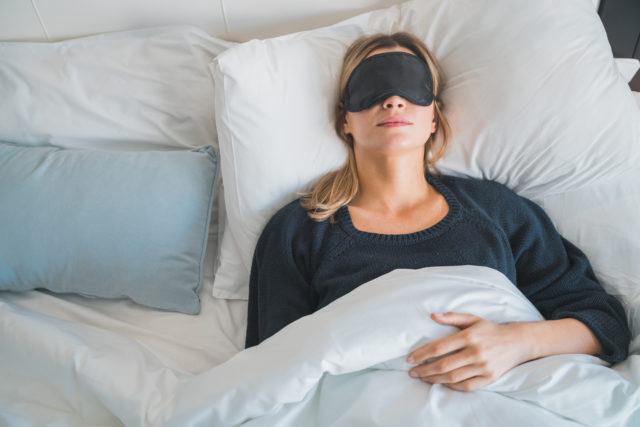New year’s resolutions can come in all different shapes and sizes, but none of your good intentions will mean very much if you can’t follow through.
That’s why this year, I suggest putting the resolutions on hold and opting for lifestyle changes that will help you be the best version of yourself – regardless of your goals.
There is an unending list of areas in which you could focus your attention for a “new year, new you,” but from my experience, there are the big three that can make the most significant difference when it comes to staying on track mentally.
Those include:
- Stress management
- Optimal sleep
- Gut health
When either of these areas of health is off-track, you’ll find it challenging to stay present and motivated in your life. If you can cut out the noise and keep your sights on these three areas, you’re guaranteed to see positive change in your life.
In this article, I’ll outline my top tips for getting better sleep, managing stress, and keeping your gut in tip-top shape.
Three Areas To Focus On To Start The New Year Off Right
#1 Learn How To Manage Stress

If you want to have the mental and emotional energy to tackle your goals for 2024, starting with stress management is a must. Why? Because no matter who you are, where you live, or what you do for a living, stress is an unavoidable part of life.
How you deal with stress, however, is entirely in your hands.
My top tips for managing stress include:
Meditation
Research shows that even ten minutes of mindfulness-based breathing meditation can make a significant difference in feelings of anxiety[1]. An example of a simple mindfulness meditation includes paying attention to your breath, following each inhale and exhale, and bringing your mind back to your breath when it wanders. The key is to not get upset or judge yourself when your mind wanders, but simply return your attention to your breath again and again.
Breathe
Taking a deep breath in a moment of stress does wonders for your nervous system. If you can make a habit of breathing deeply for two minutes or more, the results are profound. The reason for this is that when you breathe deeply into your belly (diaphragmatic breathing), it sends a message to your brain that you’re safe. It shifts your nervous system in sympathetic mode and allows your brain and body to relax[2].
Have Fun
Life can be full of obstacles and stressors, but it can also be full of fun, connection, and community. It all comes down to where you place your attention and focus. While stress may be unavoidable, it doesn’t have to be the driving force in your life. Make it a priority to include some time in your schedule for pure fun.
What’s “fun” for one person is entirely subjective, so be sure to engage in activities that make you feel good, don’t just make them another to do.
#2 Care For Your Gut

The gut-brain connection is a burgeoning area of research. What’s more, ancient systems of medicine like Ayurveda and TCM (Traditional Chinese Medicine) have been teaching about the importance of gut-brain health for over 5000 years.
As research continues to back up the ancient medicine claims, we’re learning that what we eat and how our gut health is performing directly impacts our mental and emotional state. That’s why a poor diet and sensitivities to certain foods can cause issues like anxiety and depression[3][4].
One area of research that has produced the most intriguing data is studies into the microbiome.
There’s no shortage of data providing information about how the makeup of our gut bacteria directly impacts the function and health of the brain[5].
In fact, research shows that the bugs in your gut can produce hormones and neurotransmitters, impact your stress response and sleep cycle, promote or calm inflammation in your central nervous system, and much more[6]. This is why caring for your gut and those little gut bugs are crucial for keeping your brain happy and healthy and your mind on track.
My top tips for gut health include:
Get prebiotics in your diet
Prebiotics (not to be confused with probiotics) are foods that feed the good bacteria in your gut. You can think of prebiotics like fertilizer for your good bacteria, helping them grow and flourish. While the advent of taking probiotics is still relatively new, humans have been consuming prebiotic fiber as part of the diet for as long as history has recorded[7].
Foods high in prebiotic fiber include garlic, onions, leeks, asparagus, artichoke, and chicory root. For a simple way to get prebiotics in your diet every day, try Daily Detox, which includes a blend of prebiotics along with a treasure trove of other nutrient-dense ingredients.
Avoid sugar
Sugar is one of the most toxic foods out there, and unfortunately, it’s also everywhere in the food supply. Avoiding sugar altogether can be very challenging, but limiting the amount of sugar you get on a daily basis is crucial for optimal gut health.
Research shows that high dietary sugar can promote inflammation in your gut, which can disturb your microbiome and may eventually even lead to leaky gut[8].
Purchase a high-quality probiotic
There are hundreds of probiotic products on the market, but most of them don’t stand up against the acid in your gut. They may be filled with high-quality bacteria before you digest it, but by the time it gets to your intestines, they’re all but destroyed.
That’s where spore-based probiotics come in. Spore-based probiotics deliver the bacteria in endospore form, enabling them to pass through your stomach, resisting the acidity that would typically break them down and destroy them.
Consume fermented foods with natural probiotics
If you want to add probiotics to your diet naturally, try including more fermented foods with your meals. Common fermented foods include sauerkraut, kimchi, kombucha, miso, kefir, and yogurt (make sure it contains probiotics).
#3 Prioritize Sleep

Of all my suggestions, this one may come across as the most challenging. If you’re someone who has trouble with sleep, then the idea of “prioritizing sleep” may even be met with an eye-roll – much easier said than done, right?
It’s true that sleep can elude us, especially when we want it the most. But the fact of the matter is that sleep is one of the most vital aspects of your health. While you sleep, your brain consolidates memories and new information, repairs itself, detoxes, and much more[9].
When you’re sleep deprived, it can lead to feeling groggy, unmotivated, fatigued, confused, anxious, depressed, and generally less sharp and capable. And that’s just touching on the mental and emotional aspects.
So how do you actually get the rest you need and deserve? Here are my top tips for getting a good night of sleep:
Avoid blue light
Blue light is emitted from all your screens and electronics; computer screens, phone screens, TV screens, even the digital clock next to your bed likely emits blue light into your environment while you sleep. The problem with blue light is that your brain doesn’t recognize it as artificial lighting; rather, when your eyes process blue light, it signals to your brain that it’s still daytime. This suppresses the production of melatonin, your sleep hormone. As a result, after an evening bathing in blue light when you go to turn down for the night, your brain isn’t ready to shut off[10].
To avoid blue light, do your best to put away screens and electronics at least an or two before bed. This will eliminate some of the major sources of blue light in your environment. To take it a step further, try wearing blue-light-blocking glasses. These glasses will ensure that any of the blue light leftover from overhead lighting or lamps won’t mess with your melatonin production.
It may seem like a small thing, but the impact of reducing blue light in the evening can have a significant impact on your ability to fall asleep.
Reduce your EMF exposure
EMF is everywhere in the environment, and some research indicates that these frequencies may make it more challenging to wind down and fall asleep at night. To reduce your EMF exposure, unplug your WiFi router at night while you sleep. You can also put your phone on airplane mode and keep electronics out of the bedroom.
Care for your gut health
Once again, it comes back to your gut bacteria. Research shows that imbalances in your microbiome can impact sleep quality[11]. Be sure to care for your gut bacteria by taking spore-based probiotics and consuming plenty of prebiotic foods and probiotic-rich foods like the fermented products mentioned above.
Read before bed
Instead of watching TV with all of its blue light, try reading before bed instead. This will not only reduce the amount of light getting into your eyes late at night, but if you read fiction, it can get your imagination going, which helps to shut off your analytical mind – the part of your brain that typically keeps you up at night.
Don’t eat or drink too late at night
When you eat or drink at night, you give your body something to process, which keeps your metabolism working into the late hours. For restful sleep, you want all of your energy going to repair and detoxify, not breaking down your midnight snack or processing a glass of wine.
If you have a habit of late-night snacking, you’ll be shocked at how much better you feel in the morning when you stop eating a couple of hours before bed.
Takeaway

The new year is almost here, and many people are ready for a change. Start off this new year right by taking care of your health (mind and body) and strengthening your resolve. Whatever your goals are for 2024, you’ll have a much easier time reaching them when you’re managing your stress, caring for your gut health, and getting a good night of sleep.









